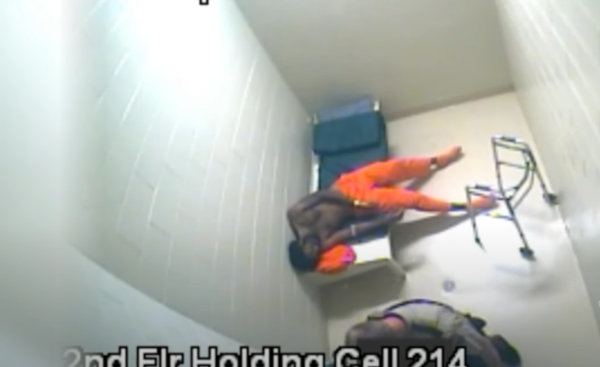A Minnesota nurse who was working at the Beltrami County Jail in August 2018 is speaking publicly for the first time after previously acting to ensure the events that led up to the death of a 27-year-old Black man more than two years ago became known.
According to Stephanie Lundblad, Hardel Sherrell was denied medical care until his death at a county jail in Bemidji, Minnesota although he repeatedly pleaded for help. Lundblad said staff members accused Sherrell of feigning paralysis and other symptoms.
“I felt like I had witnessed a murder,” she told KARE 11.
Sherrell first arrived at the jail on Aug. 24, 2018. He had been arrested on charges of unlawful possession of a firearm. Over a period of six days, his condition deteriorated. Although by the morning of Aug. 28 he told guards and a nurse he could not feel anything from the waist down, the nurse and guards at the jail insisted he was faking. Video footage shows Sherrell’s limp form being dragged from a wheel chair to a cot on the floor as he grew increasingly weak.
By the morning of Aug. 30 Dr. Todd Leonard of MeND Correctional Care, a private company that provides “cost-effective” medical care to detained patients had reviewed the latest report from the unidentified MeND nurse who had been seeing Sherrell, and recommended the ailing inmate be taken to a hospital emergency room. Jail administrator Calandra Allen countermanded the doctor’s directive, claiming Sherrell was an escape risk.
By Aug. 31, when Lundblad had taken over from the previous nurse, Sherrell’s condition was dire. When Lundblad encountered him for the first time on that day, his mouth was drooping, he was “covered in sweat and urine” and was wearing a diaper that had been soaked through. “He had tears coming down his face,” she said of the father of three. “It looked like a man that was suffering, that was sick, that was dying.”

At the time, Lundblad, who was then a new hire at MeND, found that Sherrell’s vital signs indicated that something was wrong. Lundblad feared he had suffered a stroke and overrode jail staff and mandated that he be transported to an emergency room.
At Sanford Hospital, a jail guard told a doctor that Sherrell was faking his symptoms. He was diagnosed with malingering — feigning illness — and discharged from the hospital.
“We had no idea that the emergency room physician discharged him to his death,” Lundblad said.
Sherrell died on the floor of his jail cell the next afternoon.
Lundblad said she didn’t find out about what had happened to Sherrell until two days after he passed away. She resigned from Mend soon afterward, after she says Dr. Leonard, the owner of the company, told her not to “jump to conclusions” about the circumstances surrounding Sherrell’s death because it could jeopardize his business.
Lundblad chose to speak out about what she witnessed because of the Derek Chauvin trial, adding that what happened to Sherrell was weighing on her.
The Ramsey Medical Examiner found that Sherrell died of pneumonia and brain swelling, although a private autopsy included in a lawsuit filed by Sherrell’s mother, Del Shea Perry, determined the cause of death was Guillain-Barre syndrome, a rare but treatable condition in which the body’s immune system attacks parts of the nervous system. The condition can cause paralysis across the entire body, although with treatment most people will survive the condition. The mortality rate for Guillain-Barre syndrome is between 4 and 7 percent, according to the Mayo Clinic.
According to the lawsuit that names Beltrami County Jail, MeND Correctional Care and Sanford Hospital as defendants as liable for Sherrell’s death, Sherrell called Perry three days into his stay at the jail and told her his back was hurting, that he had fallen out of his bunk bed, and that he couldn’t feel his legs.
Perry said that when she learned of her son’s death on Sept. 2, officers came to her door and said “We just came to tell you he died,” without offering condolences or warning.
The suit also claimed that despite the fact that Sherrell showed symptoms the doctors said would necessitate a return to the hospital, jail staff ignored them.

At one point, after returning from the hospital, Sherrell was left on the floor of his cell for nearly eight hours after falling off his bed despite repeatedly calling for help, the suit says.
After learning of Sherrell’s death, Lundblad sent letters to Department of Corrections (DOC), Minnesota Board of Medical Practice and the state Board of Nursing, explaining what happened in the days before he died.
“We treat animals in kennels better than he was being treated,” Lundblad told KARE 11. “I knew that if he didn’t receive medical care immediately that he probably wouldn’t make it.”
An initial review by the Minnesota DOC found no violations. But after Perry continued to apply pressure and ask questions, the DOC took another look at the letter. Upon a more thorough investigation into records and video footage, the DOC concluded in May 2020 that there was a “regular and gross violation of Minnesota jail standards.
The review found that “policy failures were pervasive and likely stemming from the incorrect belief that Mr. Sherrell was demonstrating symptoms of malingering versus a bonafide medical condition.”
The FBI announced in July 2020 that it would investigate Sherrell’s death, an action triggered by Lundblad’s letters and persistence. Lundblad has spoken to the FBI, she told KARE 11. The investigation is ongoing.
Perry testified this month before a state House and Senate committee in support of legislation that would require counties in Minnesota to better care for inmates and allow the DOC to respond more quickly to investigate in-custody deaths. “I pray to God that what happened to Hardel never happens to any of your children,” she said. “My son did not deserve what they did to him. And that’s why this bill has to be passed. It has to be passed.”


